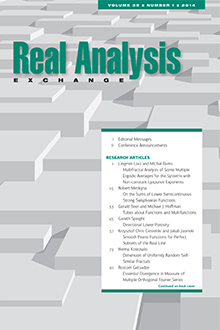Abstract
Let $f$ and $g$ be continuous real functions on the interval $[a,b]$, and let $K$ denote the set of all knot points of $f$. Let $E$ be a set of measure zero for which $f(E)$ has measure zero and $(f+g)(E)$ does not, and let $g$ be differentiable at each point of $E$ closure. We prove that $K$ must meet $E$, and moreover the intersection of $K$ with the closure of $E$ must contain a nonvoid perfect subset. Thus in particular, the function of Mazurkiewicz is a continuous N-Function with as many knot points as there are real numbers.
Citation
F. S. Cater.
"On continuous
Information





